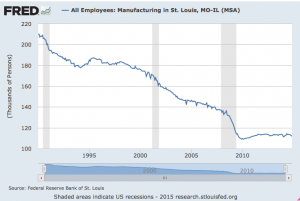Let’s define “governing” in a democracy (and I mean really governing, as opposed to administering or muddling through) as putting an agenda before the people, achieving a mandate, and enacting the agenda before the next election offers a verdict.
No one has governed the United States, in this sense, for at least a quarter century, except for transient and incomplete moments: Reagan cutting taxes in 1980-82, Clinton raising taxes to balance the budget in 1992-4, G.W. Bush cutting taxes and passing the Patriot Act after 9/11, and Obama passing the Affordable Care Act (ACA) in 2010. But those names also remind us of abandoned agendas. Under Reagan, taxes and spending rose as a percentage of GDP and the federal service added a net 230,000 jobs. In retrospect, it’s hard to say what the domestic policy agendas of Clinton or the two Bushes were. Obama stopped governing (in the sense I mean here) when he lost his House majority in 2010. No one expects anything except paralysis through at least 2016. Gallup reports that “2014 was … the first year since 2007 that the economy was not the top ranking issue, and it was the first year ever in Gallup records that dissatisfaction with government topped the list.”
Here are two ways of interpreting this situation.
First, political scientist Juan Linz would note that every presidential system other than the US has collapsed. Individual legislators are not held accountable for the performance of the country but do get credit for criticizing the president. Thus a legislature has every incentive to undermine the executive branch. When the two branches are separately elected, you are bound to see legislative obstructionism (on one side) and executive unilateralism (on the other) whenever power is split.
That is just what we have seen in the US since ca. 1986. Why not before? Because until the 1980s, Congress always had at least three effective political parties, the Democrats being composed of two radically different wings (the Southern conservatives and Northern liberals). Thus a president could normally put two of the three congressional blocs together to obtain a majority. He was basically in the position of a Prime Minister, assembling a majority in the legislature. That opportunity vanished when the parties sorted neatly into left and right, so now we face the Linzian nightmare. Presidents will rule by executive order and congresses will obstruct until the system fails.
Alternatively, political scientist James A. Morone has argued that the US system was designed to avoid governing (in the sense of this post.) That is not only true of the federal constitution, with its famous checks and balances, but also of new institutions that we have developed subsequently, such as the New Deal regulatory agencies and the ACA. They always incorporate numerous veto points because they cannot come into being unless their opponents are mollified by such barriers–and because Americans profoundly fear governing as a form of tyranny.
Morone argues that at several points in American history, the federal government (blocked by design from changing its policies) has become manifestly out of step with a changing country. To name one example, Washington could not recognize unions but was faced with a militant labor movement ca. 1932. In such cases, Americans typically denounce their hobbled government as corrupt and elitist and demand that power shift to “the people.” They are invoking a myth, because the population is not unified; in fact, one of the reasons that government is paralyzed is that it reflects citizens’ conflicting interests. Nevertheless, by invoking “the people,” the reformers win new political rights or procedures (white male suffrage in the Jacksonian Era, regulatory agencies in the Progressive Era, collective bargaining under the New Deal, community action agencies in the 1960s). These new rights and procedures change who is effectively enfranchised and thus shift policy outcomes. Once a new equilibrium is reached, the system returns to paralysis, but in better alignment with the underlying social/economic situation.
If Linz is right, our challenge is largely unprecedented, and we are in big trouble. If Morone is right, we have faced the same circumstance at least five times before and the time now looks ripe for a new set of populist institutional innovations. Based on the past waves of reform, we should expect “an exuberant mix of democratic images and contemporary organizational methods: open meetings, civic education, broad opportunities to participate, professional staff support” (The Democratic Myth, 1990, p. 28). Today that might mean Participatory Budgeting, online games for city planning, and service corps, among other examples. These reforms will adjust the political balance and policy outcomes before they ultimately disappoint by puncturing the myth of a unified people.
Neither argument is exactly rosy, but both should be taken seriously if we hope to find better ways forward.


